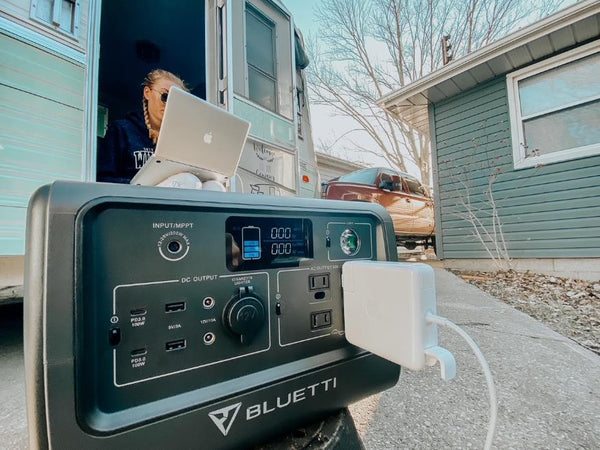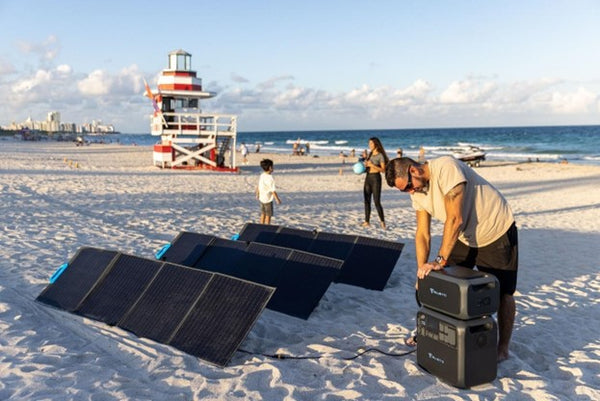Depending on where you live, you might have experienced an electric outage or are still being threatened with one in the future. In either case, generators can be an excellent solution to help maintain electricity and critical appliances in your home during a power failure.
However, when it comes time to buy a generator for camping or home, people generally opt for two primary options: gas-powered or solar-powered.
Perhaps you are wondering how a solar generator works and how it compares to gasoline or natural gas generator. Thanks to the invention of solar energy, we are seeing more and more solar powered products. It has only been a few years since portable solar generators hit the scene, but they have quickly become one of the hottest topics in off-grid equipment development. Here, we will look at the upsides and downsides of both generators to see how effective they are and which of them is more viable to use for your ideal scenario.
Gas Generators vs. Solar Generators: Power Source and Production
There are several essential differences between solar and gas generators, but the main difference is that solar generators are powered by the sun, whereas fossil fuels power gas generators.
Solar generators use photovoltaic panels to convert sunlight into electricity. These panels can be mounted on your roof or placed where they receive direct sunlight for most of the day. The solar panel generates direct current (DC) power, which is converted into alternating current (AC) power using an inverter. This AC power can charge batteries or directly power appliances and equipment.
Gas generators use fossil fuels like propane or natural gas to generate electricity through combustion. These fuels are stored in tanks that contain up to 20 gallons of fuel each. Gas generators typically have automatic shutoff features that prevent them from running out of fuel while still running and potentially causing damage to equipment or property. They produce AC power directly through combustion and do not require additional equipment such as an inverter or battery bank.
Gas Generators vs. Solar Generators: Factors to Look out For
Weighing the various factors and deciding can be time-consuming and confusing, but we have considered some of the most important considerations below.
1. Clean Energy and Recyclability
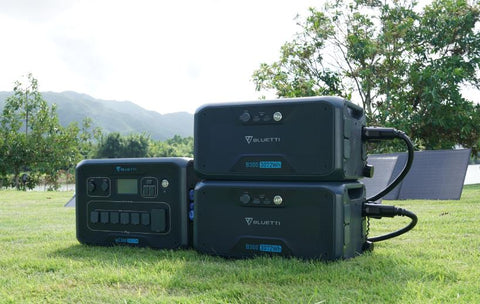
A significant benefit of using a solar generator is that it does not pollute the environment like other generators. Solar panels are made from only a few materials that are completely recyclable. The panels are made from glass and aluminum, which means they can be recycled when it comes. Moreover, since solar generators do not use any fossil fuels or toxic chemicals to generate power, they present no threat to the environment.
On the other hand, gasoline and diesel are two fuels known for polluting the air. Gas generators use oil or propane as fuel, which affects the environment when burned. Additionally, gas generators produce carbon monoxide and other harmful emissions when they run — something that is not a problem with solar power. Using a solar generator eliminates this problem because there is no need for any fuel to operate correctly.
2. Noise Emission
Gas generators have a distinct "puttering" sound while running, so if you plan on using your generator in an urban area where silence is expected at night, this may be an issue for you. However, since solar generators do not need fuel and produce no emissions, they are completely silent; there is nothing but green energy.
3. Cost
One reason you might choose a gas-powered generator over solar is that they are quite less expensive than their counterparts. Because of this lower price tag, many people prefer using them for emergencies or camping trips when they do not have access to electricity — even though they produce more noise and pollution than their solar counterparts do.
However, down the line, the fuel costs associated with gas generators will rack up quickly and be far more expensive than solar-powered generators. Fuel costs vary greatly depending on where you live, but you can expect to pay around $3 per gallon for gasoline and $6 per gallon for diesel fuel. On the other hand, solar generators do not require any fuel, so there is no need for it for them to work correctly.
Putting it simply, gas generators are less expensive up front but the long-term cost of using them is much greater than solar generators, which can be quite costly to install.
4. Safety
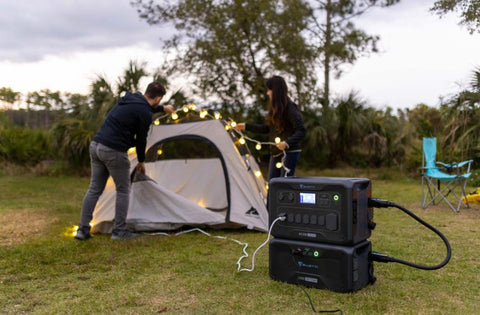
Gas generators are hazardous because they are fuel-powered and can cause carbon monoxide poisoning if misused. The fumes are also flammable and can cause fires if they come into contact with other combustible materials such as wood or paper. If you use a solar generator instead, you will not have to worry about the safety factor because they do not require fuel to run correctly and, therefore cannot explode like traditional generators.
5. Efficiency
Gas generators use natural gas or propane instead of electricity, so they do not require batteries or other external fuel sources like solar panels do; they need fuel and oil once in a while to keep running smoothly. They also run at much higher RPMs than solar generators, typically around 3,000 RPMs. This allows them to produce more energy per stroke.
In contrast, solar generators are more efficient when powering small appliances like lamps or laptops. However, if you require air conditioning or heating, you may want to use high-powered or multiple solar generators. The only limitation is how long the batteries will last before needing recharging. The energy you need from your solar generator will dictate which type of system you should buy. A small portable unit will suffice for charging cell phones and other small electronics, while larger units can provide enough power for an entire home during an emergency.
6. Portability
One of the most significant advantages of solar generators is that they are much more portable than gas generators. Most gas generators weigh more than 200 pounds, making them difficult to move around. Solar generators weigh much less and do not require much space to store or transport. Solar generators are very portable because they are lightweight and compact. Most models weigh less than 30 pounds and have a carrying handle that makes them easy to carry around when needed. Some models even come with wheels so they can be moved more quickly if required.
A solar generator can be taken anywhere you need power in an emergency. This makes them ideal for camping trips and outdoor activities such as hunting and fishing. They are also small enough to fit into your car's trunk or backseat if needed. On the other hand, gas generators are not portable and must remain connected to their fuel source for them to operate correctly. You will have to lug around heavy fuel tanks or deal with refueling your generator.
7. Maintenance
The first thing to understand is that gas-powered generators are not self-sustaining. You cannot just set them up and forget about them, as you can with solar panels or wind turbines. Gas-powered generators require regular maintenance and cleaning which means you have to spend tie and effort on them, whereas the solar power systems can be installed and left to work without any further intervention.
The maintenance of gas generators includes frequent oil changes, which can be an expensive proposition. Furthermore, gas-powered generators require gas refilling and regular cleaning of carburetors and fuel injectors. If you do not maintain your generator, it will break down or malfunction at a critical moment, leaving you without power when you need it most.
In contrast, solar panels are much easier to maintain. They do not require any maintenance at all once installed and connected to a battery bank. The only thing you need to do is keep your batteries topped up with distilled water in order for them to last long without having to replace them.
8. Easy-to-Use
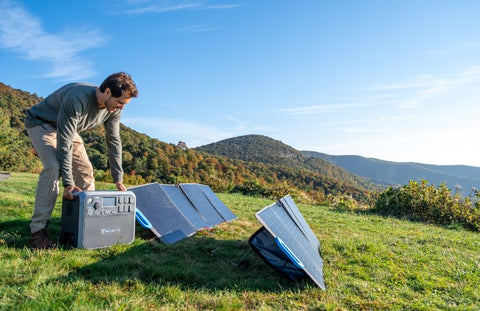
Solar generators are much easier to use than gas generators because there is no need for anyone to refuel the generator as long as it has been properly installed within the home or business premises. You plug them into the sun and let them do their job. This makes it easy for anyone with no electrical experience whatsoever to operate these devices safely and efficiently without risking an accident or getting hurt while trying to use one of these devices improperly or incorrectly. You will only have to worry about correctly positioning your solar panels to get enough sunlight throughout the day.
Solar Generator or Gas Generator: Which One Is The Right Choice For You?
If you are one of those people who would like to have the quiet most of the time and have some extra energy storage units in case of emergency, solar generators will be the best option for you. It is a combination of high power and great portability. There is no doubt that this product is built to last and low maintenance.
The advantages of portable solar generators are pretty broad. The main appeal is that they are portable, relatively easy to use, and allow you to avoid the dangerous fumes that come with gas generators. As long as you take the time to choose the right one for your needs, a portable solar generator could be an excellent way to save money, be more environmentally friendly, and have a device on hand in an emergency. It is ideal for camping trips without access to grid power or in remote locations where it is difficult to get fuel delivered quickly.
Bluetti solar generators will cater to your electricity needs wherever you are. Check out what we have in store for you.
Shop Bluetti for all your solar stneeds!

